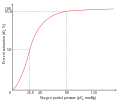Cooperativity
Cooperativity
Cooperativity is a phenomenon observed in biochemical systems where the binding of a molecule to a target site affects the binding properties of additional molecules to the same system. This concept is crucial in understanding the behavior of enzymes and receptors in biological systems, particularly in the context of allosteric regulation and enzyme kinetics.
Mechanism of Cooperativity
Cooperativity occurs when the binding of a ligand to a protein affects the binding affinity of additional ligand molecules. This can be either positive or negative:
- Positive Cooperativity: The binding of the first ligand increases the affinity of the protein for subsequent ligands. This is often seen in proteins with multiple binding sites, such as hemoglobin, where the binding of oxygen to one heme group increases the affinity of the remaining heme groups for oxygen.
- Negative Cooperativity: The binding of the first ligand decreases the affinity of the protein for subsequent ligands. This can serve as a regulatory mechanism to prevent overactivity of a protein.
Models of Cooperativity
Several models have been proposed to explain cooperativity in proteins:
- The Concerted Model (MWC Model): Proposed by Monod, Wyman, and Changeux, this model suggests that all subunits of a protein are in the same state, either all in the tense (T) state or all in the relaxed (R) state. Ligand binding shifts the equilibrium towards the R state, increasing affinity.
- The Sequential Model (KNF Model): Proposed by Koshland, Némethy, and Filmer, this model suggests that subunits can change states independently. Ligand binding induces a conformational change in one subunit, which then influences neighboring subunits to increase their affinity for the ligand.
Examples of Cooperativity
- Hemoglobin: Hemoglobin is a classic example of positive cooperativity. It has four subunits, each capable of binding an oxygen molecule. The binding of oxygen to one subunit increases the affinity of the remaining subunits for oxygen, facilitating efficient oxygen uptake and release.
- Enzymes: Many enzymes exhibit cooperativity in substrate binding, which can be crucial for regulating metabolic pathways. For example, the enzyme aspartate transcarbamoylase (ATCase) shows positive cooperativity in its reaction with substrates.
Importance in Biology
Cooperativity is essential for the regulation of biological processes. It allows for fine-tuned responses to changes in ligand concentration, enabling cells to respond dynamically to environmental signals. This is particularly important in processes such as oxygen transport, signal transduction, and metabolic regulation.
Also see
| Biochemistry | ||||||||||
|---|---|---|---|---|---|---|---|---|---|---|
This biochemistry related article is a stub.
|
| Molecular biology | ||||||||||||||||||||
|---|---|---|---|---|---|---|---|---|---|---|---|---|---|---|---|---|---|---|---|---|
|
Transform your life with W8MD's budget GLP-1 injections from $125.
W8MD offers a medical weight loss program to lose weight in Philadelphia. Our physician-supervised medical weight loss provides:
- Most insurances accepted or discounted self-pay rates. We will obtain insurance prior authorizations if needed.
- Generic GLP1 weight loss injections from $125 for the starting dose.
- Also offer prescription weight loss medications including Phentermine, Qsymia, Diethylpropion, Contrave etc.
NYC weight loss doctor appointments
Start your NYC weight loss journey today at our NYC medical weight loss and Philadelphia medical weight loss clinics.
- Call 718-946-5500 to lose weight in NYC or for medical weight loss in Philadelphia 215-676-2334.
- Tags:NYC medical weight loss, Philadelphia lose weight Zepbound NYC, Budget GLP1 weight loss injections, Wegovy Philadelphia, Wegovy NYC, Philadelphia medical weight loss, Brookly weight loss and Wegovy NYC
|
WikiMD's Wellness Encyclopedia |
| Let Food Be Thy Medicine Medicine Thy Food - Hippocrates |
Medical Disclaimer: WikiMD is not a substitute for professional medical advice. The information on WikiMD is provided as an information resource only, may be incorrect, outdated or misleading, and is not to be used or relied on for any diagnostic or treatment purposes. Please consult your health care provider before making any healthcare decisions or for guidance about a specific medical condition. WikiMD expressly disclaims responsibility, and shall have no liability, for any damages, loss, injury, or liability whatsoever suffered as a result of your reliance on the information contained in this site. By visiting this site you agree to the foregoing terms and conditions, which may from time to time be changed or supplemented by WikiMD. If you do not agree to the foregoing terms and conditions, you should not enter or use this site. See full disclaimer.
Credits:Most images are courtesy of Wikimedia commons, and templates, categories Wikipedia, licensed under CC BY SA or similar.
Contributors: Prab R. Tumpati, MD

